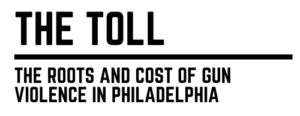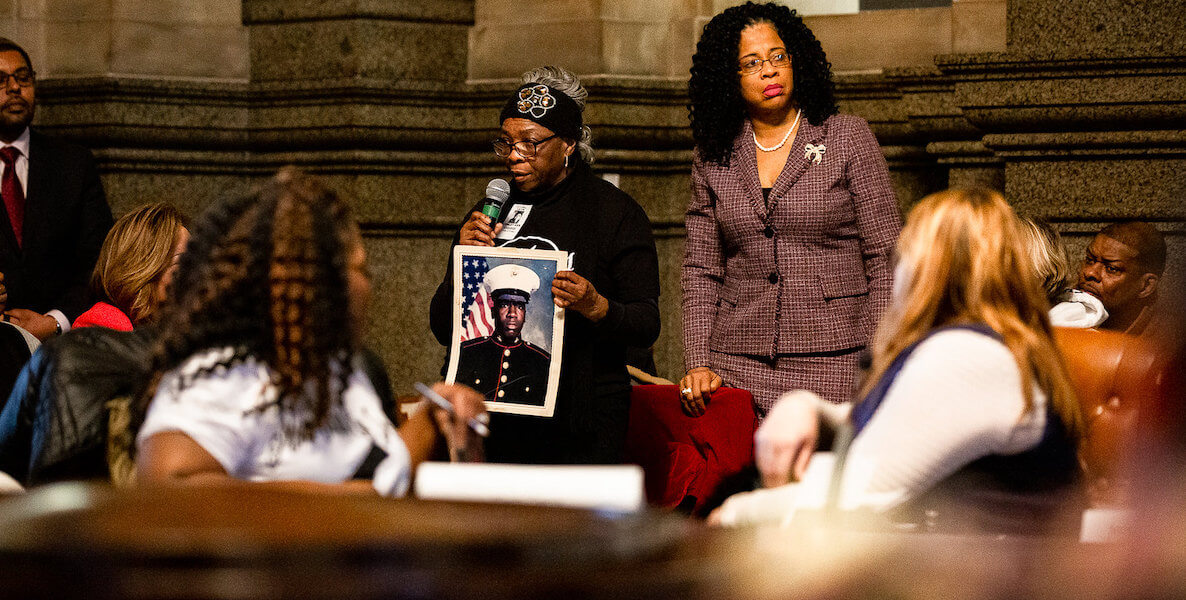Nine months into a year that is on track to have the highest number of shootings in decades, Philly still has no coordinated, data-driven plan to combat gun violence—a fact that is shameful and devastating.
The work, instead, is piecemeal, often left to underfunded and overwhelmed community groups in neighborhoods across the city. Now, those groups have the opportunity to get real funding from the city and state to expand their programs, track their results and—at least this is the aim—make a dent in the surge of gun violence that has plagued the city for the last year.
Through funding from the state legislature, the Pennsylvania Commission on Crime and Delinquency is giving out about $23 million to gun violence prevention programs statewide, prioritizing those areas with the most need. “Philly is top of that list,” says Stephen St.Vincent, PCCD’s director of gun violence reduction initiatives (and a former Citizen staff member).
“The goal is for immediate impact,” St.Vincent says. “And the main mission is preventing violence.”
The funding is available to community-based organizations; higher ed institutions; cities, counties and District Attorney’s offices, with grants ranging from $2 million over two years to $50,000 over the same period to combat “community” violence. The first (intentionally simple) part of the application process is due October 15th, with plans to distribute the funds by the first of the year.
“The goal is for immediate impact,” St.Vincent says. “And the main mission is preventing violence.”
PCCD is chaired by former Philly Police Commissioner Charles Ramsey, and funded by the legislature to coordinate partnerships among federal, state and local policymakers and citizens in public safety and criminal justice; among its best known tasks is providing services to victims of crime. Making communities safer is one of the goals outlined in PCCD’s 2021-2025 strategic framework, which specifically lists providing “support for community-led efforts to prevent gun violence” among its aims.
This is the third round of PCCD funding for gun violence prevention this year. In March, the commission distributed $7.5 million, including nearly $3 million in community-based violence intervention programs in Philly; most of that went to health systems and local universities. The commission is in the process of distributing another $10 million statewide to 53 projects (pending final approval), including almost $6 million to Philly groups.
The state money is in addition to about $20 million for community groups from the City’s Anti-Violence Community Expansion Grant Program, which extended its application deadline by two weeks, to this Friday; and to the nearly $500,000 distributed since May by the District Attorney’s office, which gets the funds from civil asset forfeitures. (St.Vincent says he is coordinating with the City to ensure they are not funding the same projects at the same organizations.)
 All together, that could mean an infusion of more than $40 million this year in community-based programs in Philadelphia with the intention of reducing gun violence. Not all of that money, is going to organizations that directly address the violence happening right now: Youth writing nonprofit Mighty Writers, for instance, is set to receive $225,000 from PCCD; Mural Arts Philadelphia will get $187,000 for an arts program for formerly incarcerated women; and Rock to the Future $87,000 to expand after school programming. Those may, long-term, keep people away from violence, but are not likely to stem the shootings now in a measurable way.
All together, that could mean an infusion of more than $40 million this year in community-based programs in Philadelphia with the intention of reducing gun violence. Not all of that money, is going to organizations that directly address the violence happening right now: Youth writing nonprofit Mighty Writers, for instance, is set to receive $225,000 from PCCD; Mural Arts Philadelphia will get $187,000 for an arts program for formerly incarcerated women; and Rock to the Future $87,000 to expand after school programming. Those may, long-term, keep people away from violence, but are not likely to stem the shootings now in a measurable way.
Most of the funding, though, is for groups in particularly hard-hit neighborhoods to develop or expand outreach and intervention programs for those most at risk of involvement with gun violence, or for services to treat victims and community members suffering trauma from the violence in their neighborhoods. For example, the Anti-Violence Partnership is set to receive $250,000 for trauma-informed counseling services for victims and their families; Frontline Dads $250,000 for a program to educate train and find employment opportunities for at-risk young men; and P.S. 14 Foundation $100,000 for a Diversion Influencer Initiative that will (among other things) employ young men to create social media and other campaigns to prevent violence among their peers.
Will any of this have an effect on the gun violence rate in Philly? The City’s Office of Violence Prevention has already distributed $2.1million in funding to community groups over the last two years—and the homicide rate has skyrocketed. As of last year, as The Citizen’s Jo Piazza learned when reporting the podcast Philly Under Fire, the goals of the OVP, despite its name, was not necessarily to target violence-fighting groups. “Our job is to be a voice to the community,” OVP Executive Director Shondell D. Revell told Piazza. And, in testimony to City Council last year, First Deputy Managing Director Vanessa Garrett Harley, who oversees the OVP, admitted to not having any metrics that would show whether that public funding had any effect whatsoever on, well, anything.
“We don’t want to just dump money on these programs,” St.Vincent says. “We want them to be stronger and more stable and grow and keep doing this good work and do more of it as the years go on.”
This year, the City has hired the very competent Erica Atwood to oversee and coordinate its violence prevention efforts. And unlike in the past, both the City and the state plan to hire a consultant to evaluate the effectiveness of the programs being funded by public money—to “track the money,” St.Vincent says—though he cautions that making a direct connection between the work of an organization and the homicide rate may be impossible, given the relatively small amount of funding and timing of the grants.
“If we can see programs grow, if these programs deliver the services they say they are going to with the money, they will be successful,” he says.
Even St.Vincent acknowledges that this effort is not enough to solve the shooting problem in Philadelphia. Even if these groups had all the money they needed, it wouldn’t be enough. Finding an end to gun violence requires a full-scale commitment from city leaders—the Mayor, the Police Commissioner, the District Attorney, City Council—as well as a comprehensive plan to ensure those most at risk of being involved in shootings have access to economic, educational and social opportunities. On these fronts, our city is far behind other communities that have dramatically reduced shootings over the last several years—Newark, Camden, Oakland, Chester.
MORE ON THE FIGHT TO END GUN VIOLENCE IN PHILLY—OR LACK THEREOF
As all those cities have shown, community members are a key part of keeping the peace, neighborhood by neighborhood. This funding, along with technical assistance to track results, is to support that work. “We don’t want to just dump money on these programs,” St.Vincent says. “We want them to be stronger and more stable and grow and keep doing this good work and do more of it as the years go on.”
In an effort to make the application inclusive and accessible, the process to apply for funds is two-fold. First, applicants will fill out a Survey Monkey form with a narrative about who they are, what they hope to achieve, and budget information. Groups that pass the first round will be invited to use an Egrants system that will easily take them through the process of filling in more details. St.Vincent says he is also available to answer questions and help groups navigate the system.
PCCD’s School Safety and Security Committee will decide which organizations will be invited to fill out a full grant application at its December 1 meeting. To apply, go here.
![]()
CHECK OUT OUR SEVEN-EPISODE PODCAST EXPLORING SOLUTIONS TO PHILLY’S GUN VIOLENCE EPIDEMIC
Header photo by Jared Piper for Philadelphia City Council / Flickr



